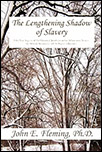THE LENGTHENING SHADOW OF SLAVERY by John E. Fleming (Malawi)
Because Black students continue to face significant academic and financial challenges in their attempt to receive higher education in America, their home country, Dr. John Fleming felt that there was a pressing need to re-publish the 1976 edition of his book, The Lengthening Shadow of Slavery: A Historical Justification for Affirmative Action for Blacks in Higher Education with a new 2023 edition entitled The Lengthening Shadow of Slavery: Fifty-Year Reprise of the Historical Justification for Affirmative Action for African Americans in U.S. Higher Education. Dr. Fleming strongly felt that it was necessary to explore, yet again, why the U.S.’s own African-American students receive the worst educational outcomes at all levels of the American education pipeline while foreign students who major in STEM (science, technology, engineering and mathematics) fields at U.S. colleges and universities get the best education money can buy.
On the face of it this is not an easy question to answer; but it is certainly a question that deserves an answer, e.g., an answer that looks across the landscape of the many issues that have confronted Black families in the U.S. since their Emancipation from slavery as they have persevered in their struggles to educate themselves and their children; but have often failed to do so through no fault of their own.
Based on the issues explored in the original 1976 edition of the Lengthening Shadow of Slavery, it is clear that despite the extraordinary and often dangerous efforts of Black freedmen to secure quality education for themselves and their children after their emancipation from chattel slavery in 1865, African Americans still confront an appalling lack of quality in the education their children receive at the elementary and secondary levels in high poverty urban schools which all too frequently fail to meet the quality standards which are common in suburban schools in America in 2023 — over one hundred and fifty years after emancipation.
Museum director, curator and historian John Fleming was born on August 3, 1944 in Morganton, North Carolina. Fleming graduated from Olive Hill High School in 1962 and began attending Berea College that same year. In 1966, Fleming graduated from Berea College. He went on to attend Howard University and earned his Ph.D. degree in American history from there in 1974.
From 1967 until 1969, Fleming served in the Peace Corps in Malawi. Upon his return from Malawi, Fleming served as an analyst on the United States Civil Rights Commission. He worked on the development of the National Afro-American Museum and Cultural Center in Wilberforce, Ohio in 1980 as project director, and then served as its director.
In 1992, Fleming was appointed to the Underground Railroad Advisory Committee, and served as the Underground Railroad Freedom Center’s director from 1998 until 2001. Following his tenure as director, Fleming was appointed to the National Museum of African American History and Culture’s Plan for Action Presidential Commission.
Fleming founded JE Associates, LLC in 2007. In 2015, Fleming was hired as the museum director for the National Museum of African American Music in Nashville, Tennessee.
Fleming has won multiple awards for his work. In addition to his awards. He has published three books, The Lengthening Shadow of Slavery: Historical Justification for Affirmative Action for Blacks in High Education in 1976; The Case for Affirmative Action for Blacks in Higher Education in 1978; and A Summer Remembered: A Memoir in 2005.
John Fleming and his wife, Barbara Fleming, have two children.
•
The Lengthening Shadow of Slavery: Fifty-Year Reprise of the Historical Justification for Affirmative Action for African Americans in U.S. Higher Education
by John Emory Fleming, Ph.D (Malawi 1967-69)
Silver Maple Publications
220 pages
October 2023
$14.99 (Paperback)


Thank you Dr. Fleming for keeping the need for continuing and increasing the need and benefits of affirmative action alive before our eyes.
Wouldn’t each of us, regardless of social/economic status, benefit from more affirmative action starting at birth and continuing into adulthood?
Greetings John. Loved your story. Also look forward to reading your book. Plan to order it today.
John Pettit
Excellently done, John.